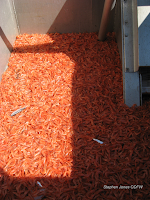Living On Earth
Living On Earth
We're all here, of course, living on earth. But this is unashamedly a plug for a broadcast series of the same name, one entirely listener supported, and one quite fascinating in its exploration of the environmental issues facing us in the world. As one example, this week's programming featured several pieces on the ocean, one being the noise in the ocean from passing ships (and not mentioned but also the controversial military sonar experiments again in court after whales and porpoises began washing up on beaches near the experiments, apparently with damage to their hearing and echolocation centers). Here's how they began the piece on noise in the Seattle/Puget Sound area: Picture yourself at a noisy bar. You realize that you have been shouting at the top of your lungs all night just to be heard. Well, orcas in Puget Sound are in kind of the same situation. The problem was that in studying the animals, it was discovered that in keeping up the having to make louder calls, the mammals were increasing their metabolic rate by nearly 80%...orcas are down to just 81 in number in the area (although worldwide it is estimated that orcas have a population of nearly 50,000).Or this piece in the same show talking of Boston harbor's sewage treatment plant: We get up on average 360 million gallons of wastewater a day into this plant with peaks up to 1.3 billion gallons per day...we remove 94 percent of the total solids out of that wastewater and the remaining clean water then gets disinfected, dechlorinated and then sent out into Massachusetts Bay for final disposal...Eventually all the treated effluent is disposed of in Deer Island's outfall, it goes into a deep broad tunnel that's 450 feet below the surface, travels nine-and-at-half miles eastward out into Massachusetts Bay and that gets distributed over that last mile and a quarter through 53 risers that are just like sprinkler heads on the bottom of the ocean floor, and that actually disburses over a wide area so you don't get that single one open end of a pipe that's going to impact that one area. That story, of building the nine-mile tunnel under the ocean, and making is operational (which resulted in two divers losing their lives), follows the story of Boston cleaning up it harbor waters.
 |
| Bycatch with LED lights |
 |
| Normal bycatch |
There was more, of course, and all of it available for streaming. And I was excited to discover such a well-produced and well-researched series...but this series has been in operation for 25 years! How could I have missed it? As many of you have likely found at some point, you'll find the same moment of discovery...someone tells you about a new song only it's a song that's been around for ages (I had just heard a local deejay relay such a story), or a book or movie you're seeing for the first time only to discover that it has been popular with others for years or decades. It's a product of our information world, that there is so much out there that it is sometimes difficult to sort through the entirety. But finding that gem is still rewarding and the old school of word-of-mouth (or social media) takes over and soon the recognition follows. Underneath all of this is the effort by reporters and artists and scientists trying to get their message out, trying to tell the world about an important discovery or a new way of thinking, and for them penetrating and adding to the world of information is equally daunting; but still they keep trying, patiently waiting for that one extra listener or that one extra reader.
Living On Earth is worth checking out, and there are likely many more such series out there in a variety of fields equally well-produced. But what I liked about this particular series was its reminder of just how complicated and convoluted and delicate our life here is on this planet and how we are both changing our planet and trying to stabilize it. And just as with finding that new trail or that new vista point when you hike or camp or fish or ride the highways, that moment of discovery, that moment of awe is good for your innards, a dopamine rush that worth talking about to others...for we are all Living On Earth.



Comments
Post a Comment
What do YOU think? Good, bad or indifferent, this blog is happy to hear your thoughts...criticisms, corrections and suggestions always welcome.